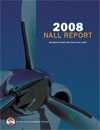 AOPA Air Safety Foundation’s 2008 Nall Report, which details general aviation accidents, trends, and factors for 2007, states that pilot-related accidents accounted for about three-quarters of both total and fatal general aviation accidents in 2007. Each of the pilots involved in these accidents made a decision, or a series of decisions, that culminated in an accident. These decisions are part of the accident chain of events, and often, any one decision made differently could have changed the outcome. The Nall Report looks at the data in a number of different ways to give us both an overall and a detailed understanding. I wonder what percentage of these accidents could have been avoided if the pilot had been sharper, either physically or mentally. One thing is clear—as pilots, we need to be on top of our game when we are at the controls.
AOPA Air Safety Foundation’s 2008 Nall Report, which details general aviation accidents, trends, and factors for 2007, states that pilot-related accidents accounted for about three-quarters of both total and fatal general aviation accidents in 2007. Each of the pilots involved in these accidents made a decision, or a series of decisions, that culminated in an accident. These decisions are part of the accident chain of events, and often, any one decision made differently could have changed the outcome. The Nall Report looks at the data in a number of different ways to give us both an overall and a detailed understanding. I wonder what percentage of these accidents could have been avoided if the pilot had been sharper, either physically or mentally. One thing is clear—as pilots, we need to be on top of our game when we are at the controls.
We can’t separate our pilot life from the rest of our life—our overall fitness affects our performance in the cockpit, as much as it does at work, home, school, and the gym. How healthy are we—emotionally, physically, and mentally? Are we stressed, exhausted, depressed, overweight, weak, or hungry? Have our unhealthy habits brought us to the point of being a borderline diabetic, or of experiencing chest pains? Most of us do not routinely carry a back-up pilot with us in case we have a really bad day at altitude.
It’s no news to any of us that responsible behavior and healthy habits often go together and play out in how we think and what we do. Humans tend to be fairly predictable. Folks who are reckless on the road will be apt to carry that predilection to the airport. On the other hand, a pilot who plans alternative indoor activities in case it rains during his family’s beach vacation, typically thinks through contingency flight plans, too. You get my drift.
Our habits—our ways of living—can affect the way we fly, or whether we fly at all. Let’s take a look at two very basic lifestyle habits—diet and exercise—and how they might impact our flying.
 Diet. We are bombarded with the “eat healthy” message from all media—urging us to eat less fat, and more whole grains, fruits, and veggies, and to cut back on the caffeine, alcohol, and sugar. However, many of us do our best to ignore them, routinely choosing hot dogs, chips, and beer, or hamburgers, fries, and soda, instead.
Diet. We are bombarded with the “eat healthy” message from all media—urging us to eat less fat, and more whole grains, fruits, and veggies, and to cut back on the caffeine, alcohol, and sugar. However, many of us do our best to ignore them, routinely choosing hot dogs, chips, and beer, or hamburgers, fries, and soda, instead.
It’s challenging to eat balanced meals when you’re flying. Dinner isn’t too bad, since you’re usually done for the day, but breakfast and lunch are typically challenging. So, bring granola bars and fruit, rather than raiding the airport vending machines for high fat crackers and candy bars. Choose water rather than soda and a side salad rather than fries from the fast food menu. Pilots who have diabetes control it either by diet or by taking insulin. There’s a daily food and exercise regimen involved, and vigilant monitoring of blood sugar. If those of us who don’t have diabetes were as careful about what we ate and how active we were as those who do have it, the likelihood of our ever getting it would sharply drop. Healthier eating will decrease the likelihood you’ll have to deal with the hassles of getting and keeping a special issuance medical certificate as the years go by.
 Exercise. On the most basic level, most of us can walk more than we do. I know some (slim) pilots who park in the furthest parking space at work to incorporate a bit of exercise as they trot to and from the office. Some of my coworkers routinely take the stairs two at time; others walk on lunch hours, or workout at the gym regularly. After hours, a few choose to push a lawn mower, rather than ride, others enjoy gardening, or play a team sport, or run in marathons. Incorporating more activity into each week doesn’t have to be expensive or complicated. Golf is great, but if money is tight, go for a hike instead. You might even drag the kids or grandkids away from the TV and bring them with you.
Exercise. On the most basic level, most of us can walk more than we do. I know some (slim) pilots who park in the furthest parking space at work to incorporate a bit of exercise as they trot to and from the office. Some of my coworkers routinely take the stairs two at time; others walk on lunch hours, or workout at the gym regularly. After hours, a few choose to push a lawn mower, rather than ride, others enjoy gardening, or play a team sport, or run in marathons. Incorporating more activity into each week doesn’t have to be expensive or complicated. Golf is great, but if money is tight, go for a hike instead. You might even drag the kids or grandkids away from the TV and bring them with you.
If you are overweight (typically defined as more than 10% above your recommended weight), or obese (more than 20% above), know that your risk for these diseases increases with your weight gain—and many of these conditions are disqualifying for holding an airman certificate:
- Coronary heart disease
- Diabetes
- Cancer
- Hypertension (high blood pressure)
- Stroke
- Liver and gallbladder disease
- Sleep apnea and respiratory problems
- Osteoarthritis (a degeneration of cartilage and its underlying bone within a joint)
AOPA’s medical certification staff responds to more than 60,000 medical questions a year from members whose medical certification status may be affected by one or more of these conditions, according to Gary Crump, Director, Medical Certification Services. He says, “While we do like to talk with our members, we hope they stay in tip-top health, and call us with an aviation question rather than a medical one!”



